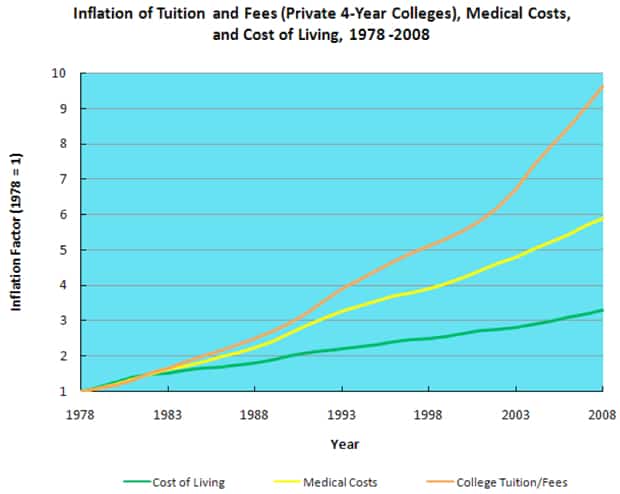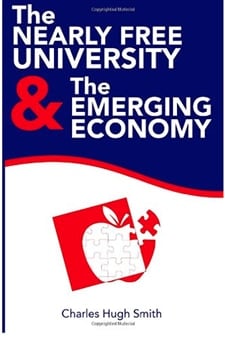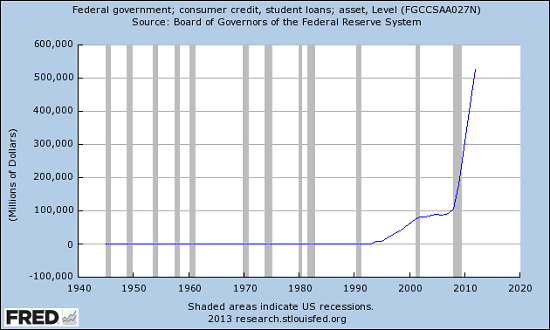The cost of higher education has skyrocketed in recent decades. The average cost of tuition is up over 1,000% since the 1980s, far outstripping price inflation and most other goods and services.

Yet despite the accelerated cost, the value of a college degree has been diminishing, both in the terms of quality of education received and future employment prospects.
In his new book, The Nearly Free University, Charles Hugh Smith takes a critical look at the state of education in the developed world and claims that it is ripe for creative disruption. There are new models and new enabling technologies that promise to deliver more effective learning at much lower cost, but they challenge a very entrenched establishment, meaning that the system will likely fight these innovations.
On the Failings of the Current Education Model
I think that the system has reached diminishing returns. It's a "factory model" in the sense that you take a standard course of material and you give it to hundreds or thousands of people. If fifty people come in to hear the lecture, they read the same textbook, they take the same test, they move on, and another fifty people take their place, it is very much an assembly-line approach to education. As the costs have skyrocketed, the effectiveness of what we are learning in that assembly-line educational model is no longer paying dividends in the real economy. Statistically, half of all recent college graduates have either no job at all or they are severely underemployed. This speaks to an enormous disconnect from the higher education system and the economy that it is supposed to be serving.
The numbers are something like this: credit card debt for the entire United States is something like $760 billion; auto loans are roughly the same thing, $700 billion or so. We have a student loan debt of over $1 trillion. A and what is really astonishing is that the federal government has taken over issuing – not just guaranteeing – but they own these loans. I am looking right now at a St. Louis Federal Reserve chart which shows that the federal government’s ownership of student loans went from a $100 million in 2009 to $550 million today. In other words, it has skyrocketed as the federal government has basically taken over about a half a trillion dollars in student debt. They are issuing it and demanding it and demanding payment on it.
You have to ask, how is it that the federal government is issuing half a trillion dollars in new student debt or taking over old debt within a few years? What is the payoff for our society of saddling college students with a trillion dollars in debt? On the other side of the payoff – in other words, the return on investment, as you mentioned – a huge study, one of the few that has actually tracked the results of a college education – like, how much do people learn in getting a four-year degree? – it is called "academically adrift." It found roughly a third of all college graduates had no increase in critical thinking skills. Another third had marginal improvements in the kinds of skills that we would consider critical in what I call the emerging economy, the parts of the economy that are actually growing and expanding instead of shriveling and fading.
On the Ripe Potential for Creative Disruption
My motivation for writing the book was to question what kind of system would we have if we could start from scratch in terms of higher education. I think that given the advances in digital technology, the answer is really clear. We would take a curriculum based on what is called MOOCs, massively open online courses, where the very best lecturers are recorded and their lectures are made available for free. Combine that with what I call 'YouTube University', where people have posted a tremendous number, thousands of little lessons on academic and practical bits alike. The core idea in YouTube University is, if you want to solve a particular kind of equation, then you can go and find a lesson that is three or four minutes long, and it shows you how to solve that one equation.
It turns out that there are academic studies on how people learn, and this constant feedback where you take one lesson, you solve it yourself, and you move on actually leads to more learning than sitting and watching a sixty-minute lecture. The point here is that the innovations that actually increase learning are available digitally now for basically free. Why should an education that is available for free cost $100,000?
I call it “accredit the student, not the school.” The basic idea is, in a profession such as architecture or law, in most states at least, just getting a degree does not mean that you can go out and practice. Because it is understood that you may not have learned enough or not learned the right stuff or not have the grasp of the material needed to actually go practice your profession, so you have to take a test. Once you pass this test, which is rigorous, then you are stamped “architect,” “attorney,” and so on, and you can go practice your trade.
Why can’t we apply this model to everything? In other words, if you get a degree in computer science and it is understood you should know something about network security, then you would pass a test that can be done online with encryption and various things. Or it could be proctored by a real person in a classroom and you pay a hundred bucks and you take the test. But you could be tested for the actual working knowledge that you are supposed to have, and if you pass the test, then you are accredited, you earn that degree. It could work in philosophy as well as computer science or biology; it could work in anything.
That eliminates this artificial scarcity of credentials. In other words, anybody could study on their own and take the test and be granted the accreditation.
Click the play button below to listen to my interview with Charles Hugh Smith (47m:16s):
This is a companion discussion topic for the original entry at https://peakprosperity.com/charles-hugh-smith-the-nearly-free-university/

